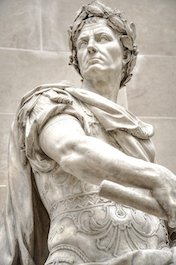Julius Caesar in a Nutshell
- JOSEPH PEARCE
More than most of Shakespeare’s plays, Julius Caesar begs a good many questions.
 Who are the heroes? Where are the out and out villains, the machiavels, who are so evident in many of Shakespeare's other plays? Where are the women? Is their relative absence significant? What does it say about politics and politicians? What does it say about the people? As a play which showcases the art of rhetoric, what does it say about rhetoric itself? If the play is to be considered a tragedy, where is there evidence of nobility or the tragic flaw which is nobility's undoing? What is the moral perspective?
Who are the heroes? Where are the out and out villains, the machiavels, who are so evident in many of Shakespeare's other plays? Where are the women? Is their relative absence significant? What does it say about politics and politicians? What does it say about the people? As a play which showcases the art of rhetoric, what does it say about rhetoric itself? If the play is to be considered a tragedy, where is there evidence of nobility or the tragic flaw which is nobility's undoing? What is the moral perspective?
Before we begin answering the multifarious questions that Julius Caesar poses, let's look at the historical context in which it was written.
It seems likely that Shakespeare wrote the play shortly after the so-called Bishops' Ban had forbidden the printing of new English history plays. Prior to the Ban, which became law in June 1599 at the behest of the Archbishop of Canterbury and the Bishop of London, Shakespeare had written many plays depicting episodes from English history in a manner which satirized his own time. Plays such as Henry IV, parts 1 and 2, Henry V, and Richard II were seen to be thinly veiled attacks on Elizabeth's anti-Catholic regime. Such satires were no longer legal under the Ban. Prompted to look further afield for the setting of his plays in order to circumvent the law, Shakespeare relocated his drama to the ancient world; Julius Caesar was the first of several plays set in classical times.
Having placed the play in its historical context, let's begin to answer the questions that Julius Caesar asks.
The play is unusual in the sense that there are no identifiable heroes. Whereas Dante places Caesar's enemies Cassius and Brutus in the lowest circle of Hell, in the company of Judas, being devoured eternally by the insatiably ravenous Satan, Shakespeare is much more nuanced in his pointing of the finger of blame.
Caesar is blinded by his own arrogance, dismissing the soothsayer's warning that he should "beware the ides of March." Such arrogance leads to ignorance, rendering Caesar blind and deaf to all good counsel, ignoring the pleading of his wife and the warnings of Artemidorus and, in consequence, leading him directly into the conspirators' trap.
Cassius is identified as a Puritan. "He loves no plays," Caesar complains. "He hears no music." In this casting of the play's least lovable character as a thinly-veiled Calvinist, an enemy of the stage and an enemy of the Church, Shakespeare is employing a satirical caricature which recurs in other works. Shylock in The Merchant of Venice is another such example, as is Malvolio in Twelfth Night.
Such depictions of Puritan characters, superficially disguised as Jewish moneylenders, Roman conspirators, or Renaissance courtiers, enables the plays to maintain the satirical applicability to contemporary England which the Bishops' Ban had sought to prevent. Compare, for instance, Caesar's description of the puritanical Cassius with Lorenzo's cautionary words in The Merchant of Venice: "The man that hath no music in himself, Nor is not moved with concord of sweet sounds, Is fit for treasons, stratagems, and spoils…. Let no such man be trusted."
Although Cassius is clearly identifiable as a Puritan, Brutus is himself tainted with the puritanical brush in his self-righteous stoicism and his disdain for the very notion of monarchy. His refusal to heed the counsel of his wife, which could have made him think twice about his involvement in the treacherous conspiracy, echoes Caesar's own refusal to take his wife's wise counsel.
In the wake of Caesar's murder, we are tempted to sympathize with Caesar's friend, Mark Antony, especially after we've experienced his rhetorical brilliance, which succeeds in turning us against the conspirators, even as it turns the mob against the conspirators. We are, therefore, manipulated by the power of rhetoric to join the mob as they rampage riotously through the streets, claiming innocent victims in their pursuit of the guilty as is always the way that mobs pursue justice.
It is not long before we witness that both sides are animated by the cynicism of realpolitik, pursuing immoral means to purportedly good ends. Mark Antony is seen at the beginning of Act 4 condemning his own family members to death and breaking the promises he had made to the mob by diverting to himself and his allies the bequests that Caesar had left to the people. He is also seen to betray Lepidus the moment his back is turned. When Octavius complains that Lepidus has proven himself as "a tried and valiant soldier," Mark Antony responds coldly that so is his horse.
It is the sound of silence within the play; the scream in the vacuum of the play's vacuity.
In the final analysis, the most striking feature of Julius Caesar is that none of its principal characters are particularly virtuous. This is not unique in the Shakespearean canon. We think perhaps of Romeo and Juliet, in which none of the characters show much virtue except for the flawed and far from perfect Friar. It is, however, unusual to see the absence of virtue to such a striking degree.
It is as though Shakespeare, echoing the words of Mercutio in Romeo and Juliet, is calling down a plague on all their houses, in the sense that he is pouring scorn on Caesar's vanity, on Antony's bloodthirsty opportunism, on Cassius' ambition, on Brutus' brutal idealism. Yet, unlike Mercutio, he is not cursing from the perspective of a worldly cynicism but from that of a believing Christian at a time when believing Christians were being tortured and put to death by the vanity of monarchs, by bloodthirsty opportunists, by political ambition, and by brutal idealism.
There is, however, another level of meaning that is all too often overlooked completely. It is the sound of silence within the play; the scream in the vacuum of the play's vacuity. It is the unheard and unheeded voice of the virtuous. It is the voice of Caesar's wife, Calpurnia, which, if heeded, would have saved Caesar's life; it is the voice of Brutus' wife, Portia, which, if heeded, might have caused Brutus to think twice about his involvement with the conspirators. It is the voice of the Soothsayer and of the augurers. It is the voice of Artemidorus, a teacher of rhetoric, whose note to Caesar is devoid of all rhetorical devices and direct to the point of bluntness. The note is not read, the voice is not heard, and the consequences are fatal.
All that was missing in the play is the one thing necessary: the still, small voice of calm that the proud refuse to hear.
 This is Meaghen Gonzalez, Editor of CERC. I hope you appreciated this piece. We curate these articles especially for believers like you.
This is Meaghen Gonzalez, Editor of CERC. I hope you appreciated this piece. We curate these articles especially for believers like you.
Please show your appreciation by making a $3 donation. CERC is entirely reader supported.

Acknowledgement
 Joseph Pearce. "Julius Caesar in a Nutshell." Crisis Magazine. (September 11, 2021).
Joseph Pearce. "Julius Caesar in a Nutshell." Crisis Magazine. (September 11, 2021).
This article is reprinted with permission from Crisis Magazine.
The Author
 Joseph Pearce is Director of Book Publishing at the Augustine Institute, editor of the St. Austin Review and series editor of the Ignatius Critical Editions. Among the books he has authored are: Benedict XVI: Defender of the Faith, Literature: What every Catholic should know, Tolkien: Man and Myth, C. S. Lewis and the Catholic Church, Literary Catholics, Race With the Devil: My Journey from Racial Hatred to Rational Love, Beauteous Truth: Faith, Reason, Literature and Culture, Through Shakespeare's Eye, J.R.R. Tolkien's Sanctifying Myth: Understanding Middle-Earth, Unafraid of Virginia Woolf, Solzhenitsyn, and Old Thunder: A Life of Hilaire Belloc.
Joseph Pearce is Director of Book Publishing at the Augustine Institute, editor of the St. Austin Review and series editor of the Ignatius Critical Editions. Among the books he has authored are: Benedict XVI: Defender of the Faith, Literature: What every Catholic should know, Tolkien: Man and Myth, C. S. Lewis and the Catholic Church, Literary Catholics, Race With the Devil: My Journey from Racial Hatred to Rational Love, Beauteous Truth: Faith, Reason, Literature and Culture, Through Shakespeare's Eye, J.R.R. Tolkien's Sanctifying Myth: Understanding Middle-Earth, Unafraid of Virginia Woolf, Solzhenitsyn, and Old Thunder: A Life of Hilaire Belloc.




